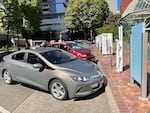Oregon’s popular electric vehicle rebate program could reopen later this year, but state officials say it could be suspended again soon after due to lack of funds.
The Oregon Department of Environmental Quality’s Oregon Clean Vehicles Rebate program offers two kinds of zero-emissions vehicle rebates, one based on income and the other open to all Oregonians. It was designed to encourage residents to transition from gas-powered vehicles. The program receives at least $12 million a year, or 45% of the state’s vehicle privilege tax — a tax paid by car dealerships.
As of January, DEQ has issued nearly $85 million in rebates to almost 30,000 applicants.
Erica Timm, the program’s coordinator, said the program received more than $15 million in three disbursements in 2023. It also had about $3.5 million in carryover funds from 2022, making the total funding available almost $18 million.
But due to overwhelming demand, Timm said, the agency had to temporarily suspend the program in May as it ran out of funding for the first time since its inception in 2018. People who bought a qualifying EV and expected to receive a rebate were put on a waiting list and are expected to receive their rebates when the program reopens.

A file photo of electric vehicles lined up in downtown Portland.
Monica Samayoa / OPB
“We anticipate reopening the program in spring 2024 and we hope to announce those 2024 open dates very soon,” she said.
Oregon has taken numerous steps to reduce the state transportation sector’s greenhouse gas emissions. Transportation accounts for nearly 40% of Oregon’s total greenhouse gas emissions, making it the largest single source in the state.
The state has adopted rules that will ban the sale of new gas-powered vehicles by 2035 and Oregon’s heavily investing in fast EV chargers across the state.
Despite the EV program’s temporary suspension, it has already made a dent in reducing fossil fuel emissions.
According to an analysis from Atlas Public Policy, which does data analysis about climate policy and other issues, the rebate program helped reduce carbon dioxide emissions by 875,000 tons, or the equivalent of two natural gas-fired power plants, in one year. The rebates are also responsible for reducing Oregon’s transportation sector greenhouse gas emissions to about 4% below 1990 levels, the analysis found.
As DEQ prepares to reopen the program, the agency plans to first pay out EV rebates to 540 people on a waitlist from 2023.
That waitlist had nearly 750 applications when the program closed last year, but DEQ was able to pay out some rebates with funding that came in during November.
After the 2023 rebate waitlist has been processed, Timm said, the program will then shift to prioritizing Charge Ahead Rebates, which are for lower-income households, defined as those that make $51,000 to $251,000 a year depending on the household size.
“We’re going to set aside 20% of the funding allocation for Charge Ahead Rebate applications,” she said. “This is to ensure that we’re meeting the statutory requirement of having 20% of our funding go to Charge Ahead Rebates.”
For 2024, Timm said, DEQ anticipates the EV rebate program could receive up to $12.6 million, but its exact funding will not be determined until that final disbursement in November 2024.
According to an agency director’s report, that level of funding would allow the program to remain open for about two months and would prompt another temporary suspension later this year.
The agency estimates the program would need $48 million in total to avoid another suspension, $35 million more than DEQ presently expects to receive.
Additional funding from the state might help make that possible, said Jeff Allen, executive director of Forth, a nonprofit dedicated to increasing equitable access to electric transportation.
Forth has criticized the state’s pause.
“When you have a program that’s opening and closing and changing all of the time and is poorly promoted, it’s really low-income Oregonians who suffer because wealthier folks have a lot more capacity and time to do the research,” Allen said.
Environment and climate advocates are calling on the state to allocate an additional $20 million to ensure the Charge Ahead Rebate program stays open and avoid another suspension that could potentially confuse likely low- to moderate-income buyers.
Buying an electric vehicle is one of the most effective and immediate ways to reduce greenhouse gas emissions, Allen said.
He said he’d prefer the state to wait to have sufficient funding to reopen the program for longer, rather than open for possibly two months.
“The state electric car rebate is incredibly important, it’s had a huge impact in the state,” he said “… It has a big impact on people’s willingness to consider buying or leasing an electric vehicle, which in turn has a huge impact on climate change and the environment and also a huge impact on putting more money back into Oregonian’s pockets.”
Once DEQ announces the program’s 2024 dates, Oregon residents must purchase or lease an EV during that open time frame to qualify for rebates. DEQ encourages residents to check out a list of participating car dealerships that offer rebates at the point of purchase. The agency also encourages low- to moderate-income residents to get pre-approved for the Charge Ahead rebate voucher, which can be used at the point of purchase or leasing of a qualifying EV.
